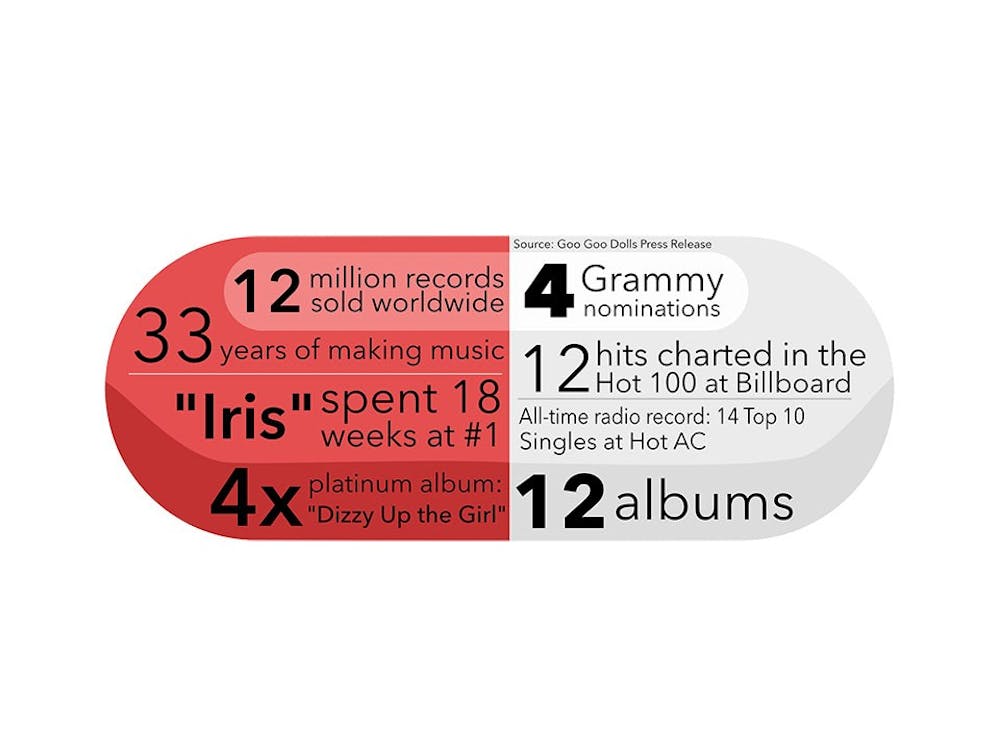The Goo Goo Dolls are more than just the guys behind "Iris."
In their 33 years together, lead singer-guitarist John Rzeznik and bassist-singer Robby Takac have released 12 studio albums and seen a complete transition from punk to pop rock. Their music isn't the same as it was in the 20th century, and neither are they.
"I think when you're younger, your whole world is — or, at least, when we were younger — our whole world was kind of about how everything was affecting us directly," Takac said. "And then I think as we got older, we sort of started to see how things affect others and how the big picture is out there.”
The Goo Goo Dolls rose to prominence on the edge of the grunge scene. Their breakthrough album, “Dizzy Up the Girl,” featured somber power ballad "Iris," but the album's other tracks were just as heavy: "Slide" observed the aftermath of a teenage abortion. "Black Balloon" described a heroin addiction. The entire record was about tumultuous relationships and a hazy sense of self, nodding to the band's dark headspace at the time.
Their latest album is a testament to just how far they've come since then. Released on Friday, Sept. 13, "Miracle Pill" refers to a very different kind of drug: instant gratification in the age of technology.
“If you’re feeling sad, you take a pill. If you need approval, you go on Instagram and receive it immediately. It speaks to the second decade of 21st century angst,” Rzeznik said in a press release. “We’re inundated by bullshit, garbage, and false solutions to every problem we have. The real path is to work hard, be nice, and keep going. However, this route gets overlooked, because we’re all looking for the ultimate shortcut and escape.”
While the band's subject matter may have changed, Takac said the lyrics are no less biting. The difference is in their perspective.
Both he and Rzeznik are now sober. They've settled down with wives and children, and Takac said they’re "in a pretty cool place right now.” This new chapter in their lives rubbed off on the songwriting in "Miracle Pill."
“I’m speaking to my daughter,” Rzeznik said in a press release. “I want her to pursue what she wants, but we’re living in a scared and unfair world. You have to bravely go out and enact the changes you want to make in order for this to be a better place.”
Their evolution didn't happen overnight, though. Takac said they've been careful not to jar fans with a vastly different sound from one album to the next. Instead, their music has gone on an organic, record-to-record journey. In that regard, the piano- and synth-rich tracks in "Miracle Pill" come as less of a surprise.
The Goo Goo Dolls started experimenting with new technology several albums back, allowing them to "twist and maneuver sound" in new ways. They've become especially partial to using vintage studio gear to smash digital sounds in compressors and preamps, dragging modern technology back into a classic sound.
“It really makes for music that feels everlasting to me," Takac said. "A lot of electronic music and stuff, it's so clean. I don’t know, it just feels too pristine and too clean. You get a little bit of stink on it and it sort of sounds a little bit more like our band.”
As they continue to evolve and explore new musical pathways, Takac reminds listeners that the makeup of Goo Goo Dolls hasn't changed since the '90s. He and Rzeznik never split up or took a break. They've encountered rough patches, but they always worked through them because they genuinely care about each other and want to see the band persevere. That, Takac said, is what separates The Goo Goo Dolls from other '90s-era bands.
"We were never a band that went away, and then got big, and then said, 'Oh, wow, we could make some money again if we got back together, played 'Iris' for people.' Like, that's never been our goal," Takac said. "We know people love to hear 'Iris,' and we love to play it for people. But we've been The Goo Goo Dolls since the beginning, and now it's what we still do."
Miracle Pill is out now. The Goo Goo Dolls will have a tour in support of the album later this fall, stopping in Charleston Nov. 17.

